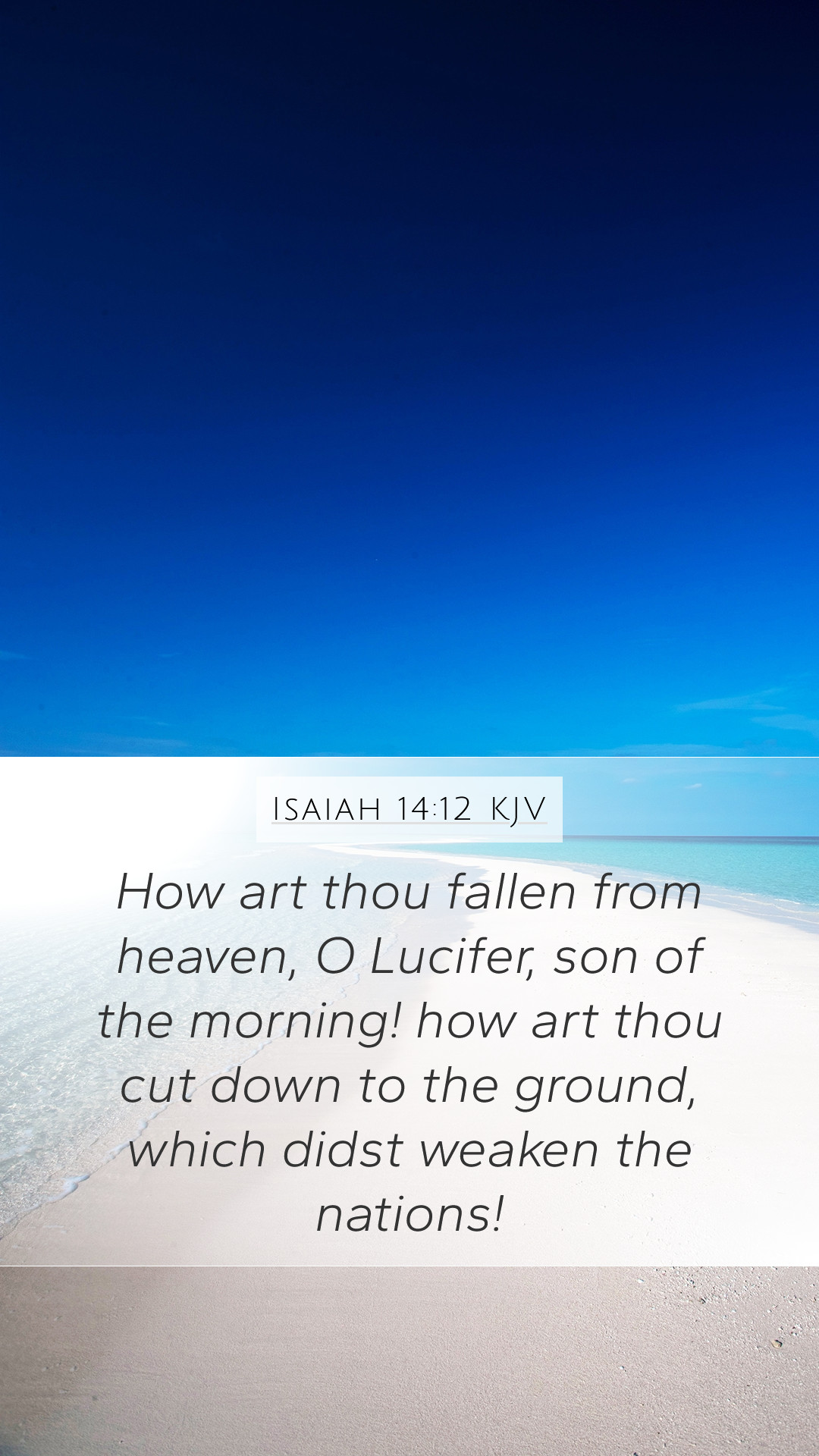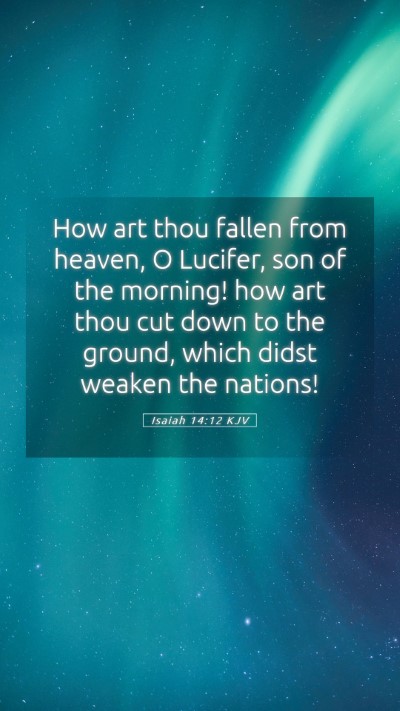Understanding Isaiah 14:12 - A Detailed Commentary
Isaiah 14:12 reads: "How art thou fallen from heaven, O Lucifer, son of the morning! how art thou cut down to the ground, which didst weaken the nations!" This verse has been the focus of extensive analysis and interpretation, revealing profound insights into the character of Lucifer and the consequences of pride and rebellion against God.
In order to aid those seeking Bible verse meanings and understanding Scripture, let's explore interpretations from renowned public domain commentaries, such as those by Matthew Henry, Albert Barnes, and Adam Clarke.
Overview of the Verse
Isaiah 14:12 presents a dramatic proclamation about the fall of Lucifer, often identified with Satan. The name "Lucifer" means "light-bringer" or "morning star," symbolizing a being once exalted who fell from grace due to pride and ambition.
Insights from Commentaries
-
Matthew Henry:
Henry emphasizes the transition from exaltation to humiliation. Lucifer is depicted as a once-glorious being who sought to elevate himself above God. His fall is portrayed as a result of divine justice, demonstrating how the proud will ultimately be brought low. Henry warns readers against the perils of ambition that seeks to rival divine authority.
-
Albert Barnes:
Barnes elaborates on the implications of Lucifer's fall as a cautionary tale about the dangers of pride. He connects the phrase "son of the morning" with an angelic being who misused his status. Barnes also explores the broader consequences of such rebellion, highlighting its effect on nations and kingdoms, asserting that pride and moral decline lead to national ruin.
-
Adam Clarke:
Clarke identifies the passage as a reference to the king of Babylon but extends the meaning to a larger spiritual context. He discusses the fall as symbolic of the inevitable downfall of all who oppose God’s authority. Clarke suggests that the verse serves as both a historical commentary and a spiritual warning, urging humility and obedience to God.
Thematic Explanations
This verse encapsulates several key themes relevant to Bible verse interpretations:
- Pride and Rebellion: The core theme revolves around the dangers of pride, illustrating how Lucifer's desire to ascend led to his downfall.
- Divine Judgment: The declaration of Lucifer's fall signifies God's justice in punishing those who oppose Him.
- Hope for the Oppressed: The latter part of the chapter transitions to the hope of Israel's restoration, making the fall of the oppressor a key point of comfort for those suffering under Babylonian rule.
Historical Context
Understanding the historical setting sheds light on Isaiah's prophecies. During the prophet's time, Babylon was a dominant empire, known for its oppression and pride. This context deepens the interpretation of how the fall of a great power can resonate with the fall of Lucifer.
Cross References
- Ezekiel 28:17: Discusses the pride and fall of the king of Tyre, paralleling the themes in Isaiah.
- Luke 10:18: Jesus mentions seeing Satan fall from heaven, affirming the fulfillment of this prophecy.
- Revelation 12:7-9: Describes the war in heaven and the ultimate defeat of Satan, reflecting the eternal conflict against pride.
Applying Isaiah 14:12 to Daily Life
The interpretation of this verse serves not just as a historical account but as a practical guide for personal conduct:
- Humility: Recognizing the importance of humility in our lives serves as a protective measure against the pitfalls of pride.
- Vigilance: Being alert to the subtle ways pride can creep into our ambitions and desires can help us stay aligned with God's will.
- Encouragement: For those feeling oppressed or downtrodden, this verse serves as a reminder of God's ultimate justice against those who misuse power.
Conclusion
Isaiah 14:12 is rich with meaning and provides profound Biblical exegesis on the consequences of pride and rebellion. Through the insights of respected commentaries, we understand that the fall of Lucifer offers both a historical lesson and a timeless warning about the perils of seeking to usurp God's authority.
This exploration serves as a valuable resource for Bible study groups, individuals seeking online Bible study, or anyone looking to deepen their Bible study insights as they delve into meaning of Bible verses.


